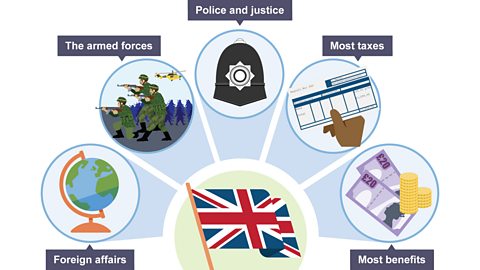Introduction
Democracy is one of the key principles of the UK’s constitution. It ensures that everyone’s voice counts when the government makes a decision.

Direct democracy
The word democracy comes from Greek, demos (people) and kratos (power/rule) which means that power is in the hands of the people. By approximately the 5th century before Christ, the city of Athens (Greece) established a significant new governing system.
At least once a month, all the citizens of Athens would meet in an assembly to discuss how the city should respond to current issues. Each citizen eligible to vote was entitled to express their views on important issues before a vote was held to decide what should be done.
This was the first time ordinary citizens had the opportunity to be involved in deciding how the country should be run. All citizens directly contributed to the democracy of Athens.
Representative democracy
Today, about 67 million people live in the United Kingdom (UK). It would be impossible to have a forum such as the one Athens to hold discussions between 67 million people every month, so there is a representative democracy in the UK. This means that citizens choose a person to speak on their behalf in a forum.
Citizens choose a representative at an election and then the elected representative discusses and votes on matters on behalf of citizens. It is therefore important that these representatives listen to the feelings of their constituents ‚Äď the people who have voted for them.
For most citizens, voting in an election is their main political action, if not the only political act. That is, the only way they participate in politics.
There are a number of opportunities for the people of Wales to vote:
- at Senedd Cymru elections
- at UK Parliamentary elections
- at local elections (for your County Council)
- at Police and Crime Commissioner elections


UK Parliament
UK citizens elect representatives to speak for them at the UK Parliament in Westminster, London in a general election. This has to happen at least once every five years.
The Parliament in Westminster is the centre of power in the UK and it is Members of Parliament, not the government, who have the final say in every decision. There are 650 Members of Parliament (MPs) in Parliament who are elected to represent their constituencies.
There are 32 constituencies in Wales for Westminster elections.
The boundaries of constituencies in Wales are decided by the Boundary Commission for Wales. Changes were made in 2023 with the aim of creating constituencies with a similar number of electors. With the exception of Ynys M√īn, at the time the changes were made each general election constituency in Wales had between 69,724 and 77,062 electors.


As a body, the UK Parliament is responsible for:
- foreign affairs
- the armed forces
- police and justice
- most taxes
- most benefits



Senedd Cymru
The people of Wales elect representatives to speak for them at Senedd Cymru in Cardiff Bay.
The current voting system
Senedd Cymru elections take place every five years. Currently there are 60 Members of the Senedd (MS) in total. 40 Members are elected to represent a constituency, that is an area with around 56,000 electors. The remaining 20 members are elected to represent larger regions. There are five regions in Wales so each region has four Members of the Senedd.
Changes to the voting system
In May 2024, Members of the Senedd voted to increase the number of members and introduce a new voting system for the next election in 2026.
Under the new system:
- Senedd elections will be held every four years instead of five
- there will be 96 Members of the Senedd, an increase of 36
- the current 40 constituencies will be replaced by 16 larger ones
- each constituency will be represented by six members
- the current first-past-the-post system will be replaced by a system that reflects the share of the vote each party has received in each of the constituencies


It will be the responsibility of Members of the Senedd to discuss and vote on matters governed by Senedd Cymru, such as:
- education
- health
- the environment
- transport
- Welsh language


UK Democracy
The UK system is democratic as our representatives are accountable to us as citizens. If we do not agree with the laws passed, we have the power to elect different representatives in the next elections.
It is therefore the duty of each Member of Parliament or Member of the Senedd to serve and represent their constituency, not just to vote according to their personal opinion.

More on Politics and democracy
Find out more by working through a topic
- count3 of 7

- count4 of 7

- count5 of 7

- count6 of 7
